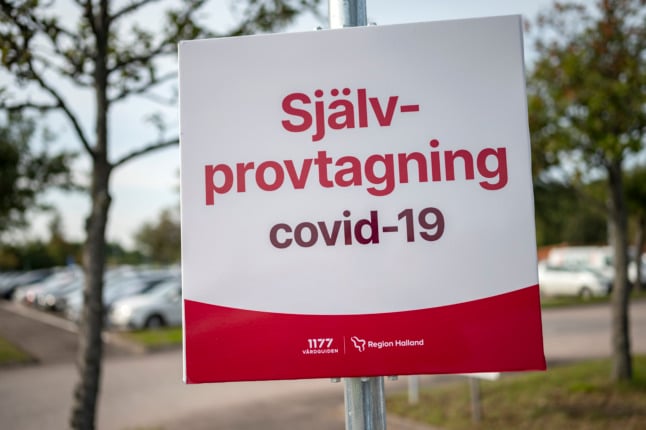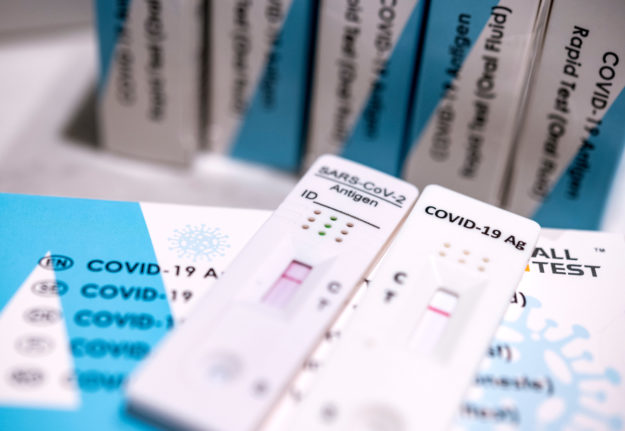Who should get tested?
The high level of infection in Sweden means that not everyone who might have Covid-19 can get tested.
Currently, the Public Health Agency’s recommendations to the regions of Sweden state that the following groups of people should get tested for Covid-19 if they have symptoms, even if they are vaccinated:
- patients, users and staff within healthcare and elderly care
- people who are unable to work from home
- schoolchildren over the age of 6
If you have had Covid-19 within the last three months, you don’t usually need to get tested again.
But note that it is ultimately up to each region to decide how to organise their testing (scroll down for more information about how to book a test in your region).
You may also be contacted by infection tracking employees and told to get tested. This also applies if you are vaccinated.
What do I do if I have symptoms but can’t take a PCR test?
If you’re not covered by testing recommendations or can’t book a test for a few days, it’s important that you stay at home if you have symptoms.
If you want to get tested but can’t book a free PCR test, you can take an antigen test (snabbtest, självtest or antigentest) instead.
These are available to buy at pharmacies and supermarkets for around 50 kronor per test, although you will need to get someone else to buy them for you if you have symptoms of Covid-19 to avoid potentially spreading the virus.
You can also buy antigen tests online from pharmacies such as apotea.se or apoteket.se – just make sure you can get them delivered direct to your door as you will be unable to collect them from a delivery location.
If you have met someone recently who has tested positive for Covid-19, or live with someone who has it, then you should also stay home, even if you don’t have symptoms.
You should stay home until the following apply:
- At least five days have passed since you became ill
- You feel noticeably better
- You have been fever-free for the last two days
How do I book a test?
If you are covered by current testing recommendations, you can book a test via 1177.se. Make sure to choose your region under “välj region” at the top of the page for specific advice for your area.
In Stockholm, for example, you can book a test via the Alltid öppet app, if you have a personal number and are registered as living in Stockholm county. You will need BankID or Freja eIDplus. If you do not have a personal number, you can visit a drop-in testing bus – all you need is ID and a mobile phone number.
In Västra Götaland, you can take a test for Covid-19 at a healthcare centre, or order a saliva test if you live in Gothenburg.
In Skåne, you can order a test via a pharmacy, a testing site or a test delivery site – some of these are available for pedestrians or cyclists, some are only open for drivers.
In all regions, if you are booking a test kit for collection, you may need someone without symptoms to collect your test for you to avoid potentially spreading the virus, so make sure to check the rules for your region.
What do I do if I test positive?
If you test positive for Covid-19, you should stay home until the following apply:
- At least five days have passed since you became ill
- You feel noticeably better
- You have been fever-free for the last two days
If you did not have symptoms when you got tested, you should stay home for five days from the day you tested positive. If you later get symptoms, you should stay home for five days from the day you first started showing symptoms, with the last two days fever-free.
You will also need to assist with tracking the spread of the virus, by informing anyone you may have infected prior to testing positive. This covers people you met with within two metres for at least 15 minutes in the time period covering 48 hours before you started feeling unwell until you are allowed out of isolation.
If you do not want to do this or cannot do this, you can inform test and trace authorities of the people you may have infected and they will contact them for you.
What do I do if I test negative?
If you test negative for Covid-19, you should stay home until you have been fever-free for at least 24 hours, and until you are feeling better.
If you still have mild symptoms like a cough or a runny nose after this time, you do not need to stay home.



 Please whitelist us to continue reading.
Please whitelist us to continue reading.
Member comments